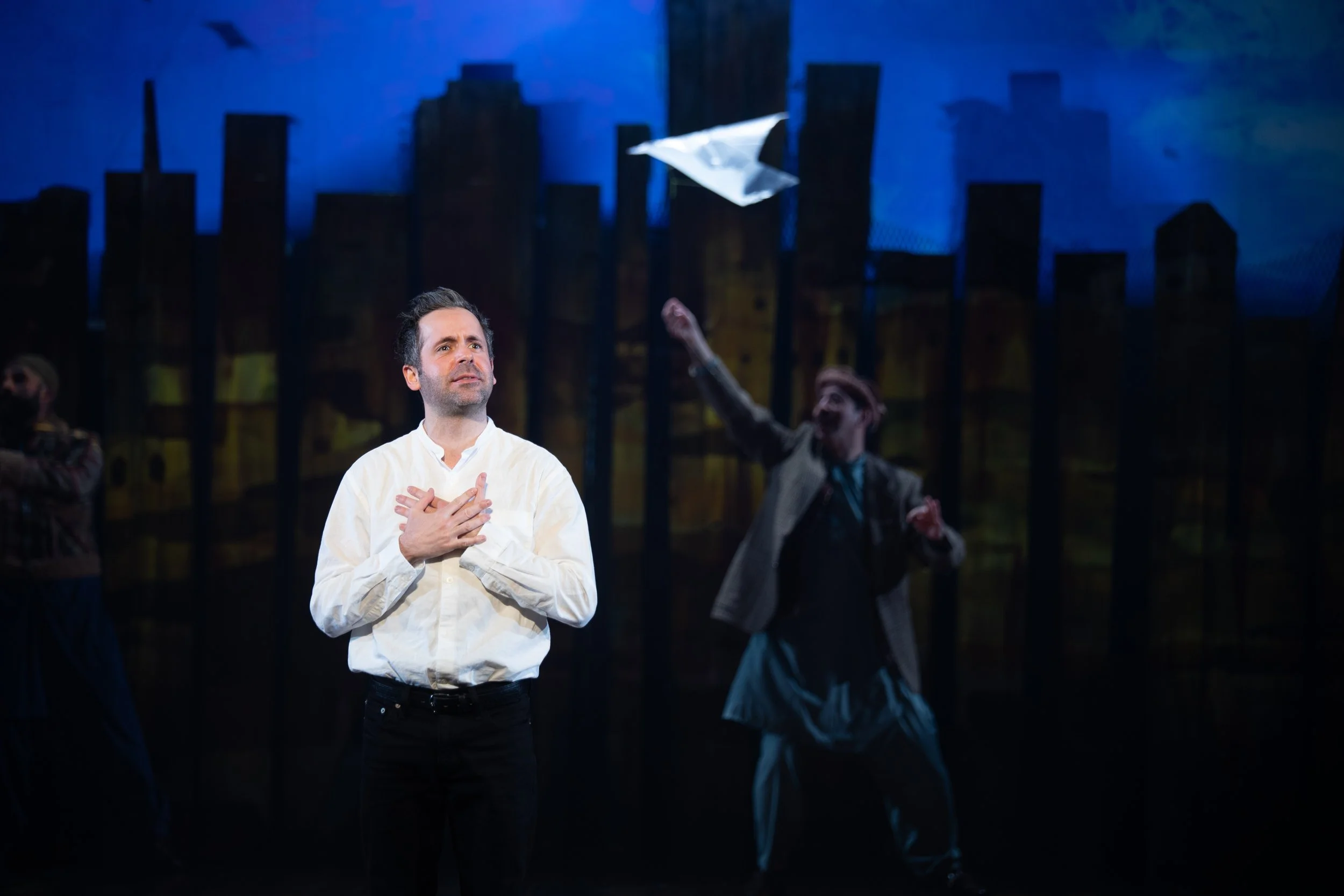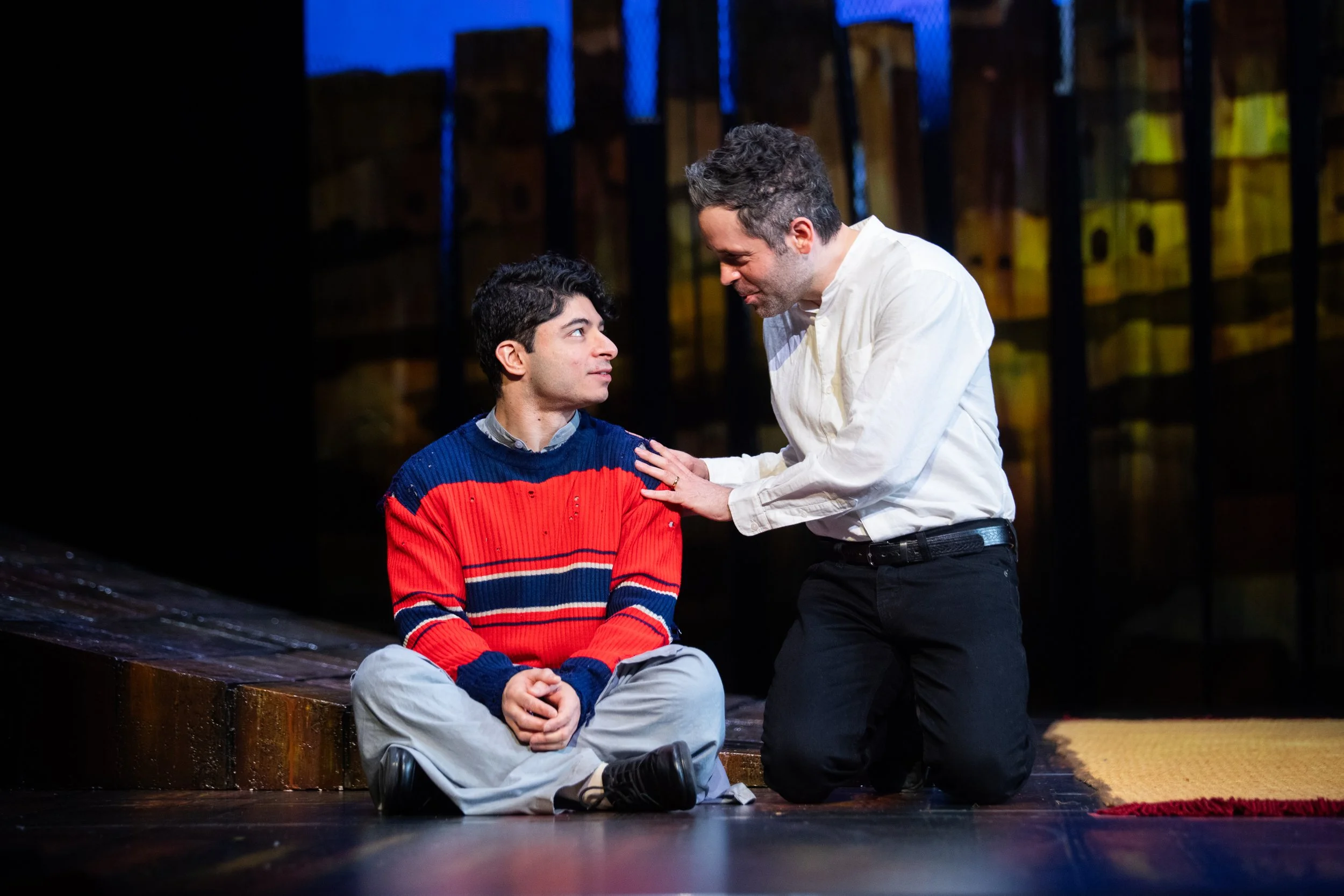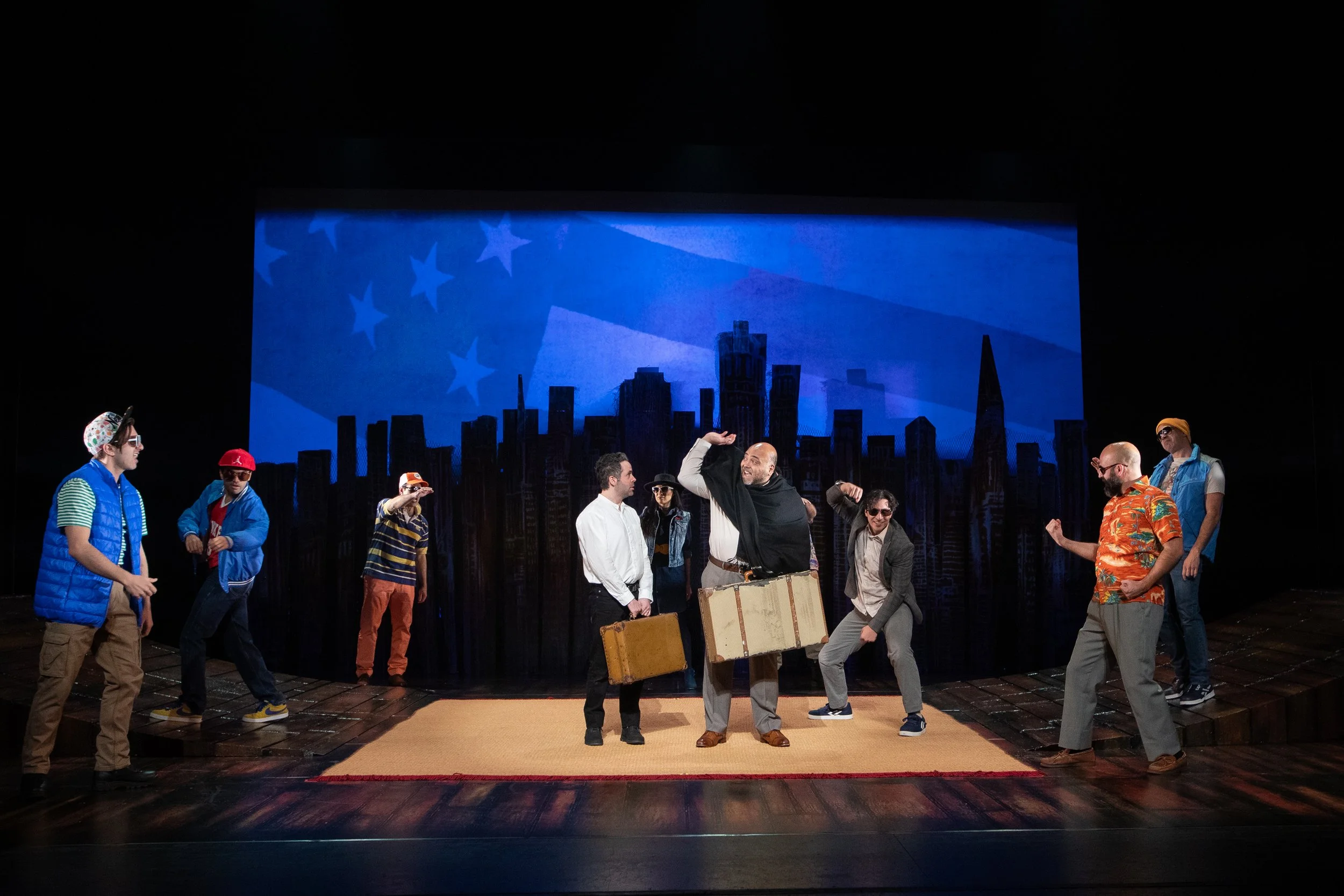The Kite Runner Glides Between the Past and Present at the Kennedy Center
Ramzi Khalaf in The Kite Runner National National Tour. Photo by Bekah Lynn Photography
In a 1971 interview with Playboy magazine, celluloid cowboy John Wayne mused, “Tomorrow is the most important thing in life – comes into us at midnight very clean.” It’s not Wayne’s philosophical ponderings that weave him into The Kite Runner, a play based on author Khaled Hosseini’s 2003 novel of the same name. It’s the two 12-year-old boys at the center of our story who invite his image: Self-proclaimed “kids who learned to crawl together,” channeling their whimsy into backyard interpretations of the Wild West as they make-believe their way through 1973 in Kabul, Afghanistan, until their midnights no longer bear such clean tomorrows.
Our inglorious hero Amir (Ramzi Khalaf) and Hassan (Shahzeb Zahid Hussain), the son of his family’s servant Ali (Hassan Nazari-Robati), point their fingers into pistols and galavant across the modestly-styled stage in the early minutes of the Kennedy Center production, adapted for the stage by playwright Matthew Spangler in 2007 and directed by Giles Croft. Amir’s gruff Baba (Haythem Noor) has gifted Hassan a Wayne-inspired Stetson hat for his birthday – a warm gesture that the audience quickly watches Amir muddy as he plucks the accessory from Hassan’s head and sports it for the remainder of the scene. Hassan, endlessly obliging, does not resist.
This dynamic between Amir, who is wealthy and bears a societally favored Pashtun ethnic background, and Hassan, working alongside his father as part of the marginalized Hazara minority, lays the foundation for the story’s central conflict. Hassan is a faithful friend; Amir will write him off as his “servant” when neighborhood bully Assef (Wiley Naman Strasser) comes around – more for convenience’s sake than cruelty’s, but then again, doesn’t that make it even crueler?
Amir’s cowardice is the cruelest thing of all when Hassan is brutally attacked by Assef, caught while chasing after the kite that Amir flew to victory in a local competition. After he crouches idly by while his partner in crime is violated, he frames the boy for theft to drive away the relentless reminders of his remorse, strong-arming Ali and Hassan out of the household – a move that makes the audience writhe in frustration.
Shahzeb Zahid Hussain (l) and Ramzi Khalaf (r). Photo by Bekah Lynn Photography
It is not until 2001, long after the Soviet invasion of Afghanistan gives way to Amir and Baba’s relocation to San Francisco at the start of Act II, that an opportunity for redemption arises. Amir, now grown and married to warm-hearted schoolteacher Soraya (Awesta Zarif), gets a call from his father’s business partner Rahim Khan (Jonathan Shaboo), who assures him “there is a way to be good again” – if he is willing to return to Taliban-controlled Kabul.
This production moves quickly, with violence and heartbreak chasing each scene off into the next. The unwavering constant is the cast’s ability to keep up their stamina. Khalaf’s dual responsibility as protagonist and narrator means he is always at the center of the onstage orbit. Amir can be infuriating, and as a viewer, I might have been ashamed to root for him if not for the sensitivity and tenderness he brings to the role. Not only is Khalaf always there, but he is always present. The production’s choice for him to star in the role of Amir at every stage of life initially strikes as awkward, but eventually, Khalaf convinces you that his age doesn’t matter. He proves that Amir’s anguish defines his being, not his years.
As the unassuming and self-sacrificing Hassan, Hussein has only a handful of lines. Still, his performance is a highlight. Whenever he speaks in a meek and childlike voice, the audience shares in a gasp or whimper. His character’s presence is gentle, even when engaged in physical self-defense, and always devastating.
Noor immediately embodies Baba’s depth, delivering his lines with humor and authenticity. Yes, he is the disappointed father archetype, but he makes the audience understand where he’s coming from. Zarif plays Soraya with such elegance and vulnerability that I wish her character had been better developed. Her forthcoming nature foils Amir’s passivity, but while we learn about her past, we never find out much more.
The Kite Runner National Touring Company. Photo by Bekah Lynn Photography
This is where most of my criticisms of The Kite Runner lie: The nearly two-and-a-half-hour show barrels forth at a breakneck pace, which doesn’t turn out to be a problem in terms of holding the audience’s attention. However, there are moments where it drags – for example, toward the end, when Hassan’s son Sohrab is upset by a scatterbrained scene that lasts five minutes and adds virtually nothing to the story. I would have liked to see the adaptation trade some of its allegiance to the book for further character development. This is a tale of human relationships, and those nuances are rarely advanced through theater with rushed and sloppily resolved plot points.
The Kite Runner’s national tour does not feature the same actors as its 2022 Broadway run, but one essential cast member stuck around: Tabla artist Salar Nader, whose soft, rich drumming scores the production. The Taliban banned music in 2021, as Nader notes in the program, but he warns the audience of crucial plot developments by drenching us with the traditional sounds of Afghanistan – melodies we might not otherwise have heard.
While Nader’s tabla dazzles, other elements of the set design are merely functional. The show’s pace is so breakneck that one generally doesn’t have time to scrutinize props or costumes. But when the characters fly kites, as they do to open and close the show, there is nothing else to notice. In a non-musical, this is the choreography. Everyone stands together, shifts their weight, vocalizes, and gazes together into an imaginary sky. There are many moments in this show when the cast exhibits this unity (including a snazzy ‘80s dance number to Kool & The Gang’s “Celebration” after Amir and Baba land in San Francisco). But here, the audience is looking up, too, joining in the shared experience – one that defined the friendship between Amir and Hassan, of frantic winds juxtaposed with quiet patience.
Cast and Stage: Wali/Doctor played by Danish Farooqui; Kamal/Zaman played by Jade Ziane; Ensemble/Pomegranate Lady/Andrew played by Sophie Zmorrod; Ensemble/Merchant/Russian Soldier played by Kevin Stevens; General Taheri played by James Rana; Scenic & Costume Design by Barney George; Lighting Design by Charles Balfour; Sound Design by Drew Baumohl; Projection Design by William Simpson; Composition & Music Supervision by Jonathan Girling; Movement Direction by Kitty Winter; Fight Direction by Philip D’Orleans; Casting by Wojcik Casting Team.
Kate Corliss is a writer based in Washington, D.C. She graduated from American University in 2024 with a B.A. in Journalism.



